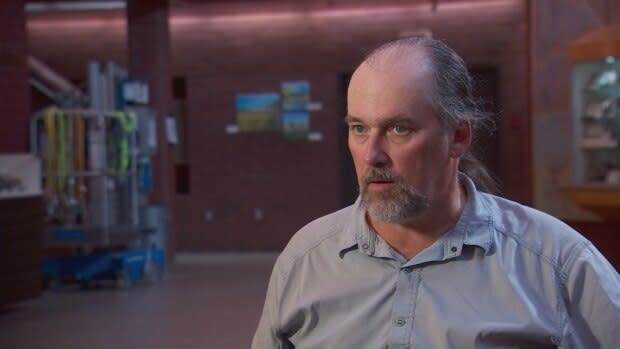An Alliance candidate's French connection

When People's Alliance MLA Michelle Conroy rose in the legislature over the last couple of years to read the prayer at the start of the day, she did something unusual for a member of her party.
She recited the prayer in both official languages.
That sets her apart in a political party that made criticism of official bilingualism a central tenet of its platform in 2018.
Last year Conroy told a party meeting in Miramichi that the media had unfairly labelled the party anti-French.
"We read it all the time, that there is a misconception of what we stand for and what we do and how we feel," she said. "And I think a lot of people don't know or don't realize that I do come from an Acadian background."

Unlike her two colleagues from the last legislature, Alliance Leader Kris Austin and Rick DeSaulniers in Fredericton-York, Conroy has direct, firsthand knowledge of francophone life.
That includes how easily the language can be overwhelmed in a majority English community.
Conroy said she loves Acadian culture. But at the same time, she opposes many of the laws and policies put in place over several decades to preserve French amid New Brunswick's English majority — measures that didn't exist when her grandparents made a fateful move.
From Kent County to Chatham
Conroy's name before she was married was Cormier. Her grandparents Marcel and Alfreda relocated from near Saint-Louis-de-Kent to Chatham, now part of the city of Miramichi, in the 1950s.
"There was not a whole lot of French back then," she said.
"For years, the Cormier family was the only French family in Chatham," said Conroy's aunt, Della Drake-Daley, who was born before the move and who still speaks French today, including at occasional gatherings of fellow seniors looking to practise their mother tongue.
Her younger brother Donnie, Conroy's father, was born after the move to Chatham, so he grew up immersed in English.
"When Dad grew up, the family of course spoke French at home and then Dad would answer in English, so he never really spoke [French] either," Conroy said.
She said her father understands the language but doesn't speak it. Donnie Cormier sat in on the interview with his daughter and sister, which took place at his kitchen table, but he declined to be interviewed.
A common story
The Cormier story is a common one in New Brunswick, reflecting a demographic pressure that can squeeze the French out of a family in a generation or two.
According to Statistics Canada, the percentage of New Brunswickers with French as their mother tongue has declined from 35.9 per cent in 1951 to 32.4 per cent in 2016.

It's particularly acute in Miramichi, a majority English area that draws in many residents of surrounding francophone communities for work.
"It's cultural gravity," said Marc Allain, the director of the Carrefour Beausoleil, a francophone community centre and school.
Without a French-language school option, "the reality is that the kid will be going to school in English, he'll be having Scouts in English, he's going to be having minor league [sports] in English.
"All of his formative experiences will be in that language and that's how he's going to perceive himself. … And that's the dynamic that we get into, built over generations."
A bulwark opposed by the Alliance
The school, which opened in 1985, is meant as a bulwark against that pressure. But it's part of the francophone school system, and the Alliance opposes the province's dual system.
Conroy said bilingual schools would allow all children to learn both languages, despite extensive social science research that shows francophone kids will tend to end up speaking English in such settings and lose their French.
Carrefour Beausoleil wasn't open when Conroy started school, and she didn't enrol in the late immersion that existed at the time.
"I kind of wish that I —" she began when asked if she regrets that.
"I don't regret not doing it," she continued. "I wish there was more French that was available then but … I remember at the time, even when I had the chance to go, I was worried about how my marks would be and things like that, changing languages."
Four tries for hospital job
Conroy decided to run for the Alliance in part because of her own experience trying to get a permanent job at the Miramichi Regional Hospital.
"I was denied employment four times," she said.
She held a casual position for eight years, dealing with the public and, she felt, doing a good job communicating in French. But a permanent position was out of reach.
It's impossible to blame individuals for something that is such a social phenomenon. It's just a question of opportunities and lack thereof. - Marc Allain, director of Carrefour Beausoleil
"I could help anybody that came to the counter but if you didn't pass the test, you didn't get hired," she said.
Conroy said she had a "two" or "intermediate" ranking in the provincial public service language proficiency, and the job required a "two-plus."
According to the provincial system, a "two" means the employee is "able to satisfy routine social demands and limited work requirements."
"Two-plus" means they are "able to participate fully in general conversation."
Not long after her fourth attempt, she decided to run for the Alliance.
Pushing for changes
At recent four-party negotiations to try to avert a provincial election, Conroy recounted her experience and the Alliance pushed for positions requiring "two-plus" to be reduced to "two."
"All four parties agreed that it has to be looked at," Conroy said. In a Facebook message posted publicly by her party, she told a constituent that francophone Liberal and Green MLAs felt she had a point.

"If anything, [the discussion] did knock down barriers and knock down some walls to let us talk about it," she said. "And I feel going forward, for the people that are lucky enough to get back in, we have something to go on."
Horizon Health doesn't comment on hiring decisions, but in a statement, vice-president Margaret Melanson said the authority takes its legal obligations seriously and bilingual service "is a key component of offering safe and quality care."
She said employees who can't offer service in a patient or visitor's chosen language must track down someone who can. She also said the network is working on new training and complaint processes and "a new language-proficiency testing model."
Aunt supports Alliance position
Conroy's aunt Della, who said she also missed out on a job years ago because her French wasn't good enough, agreed with her niece that language requirements are too onerous.
"She could do the job and she trained the person who replaced [her] — that doesn't make sense."
On the other hand, Della Drake-Daley said, her five children were all raised in English and did not follow French immersion, and four of them have jobs in New Brunswick.
"They made out fine," she said.
Impossible to blame individuals
Marc Allain said the relentless demographic pressure of assimilation is not the fault of any one parent or family.
"It's often more a question of lack of resources or lack of linguistic or cultural infrastructure than anything else," he said.
"It's impossible to blame individuals for something that is such a social phenomenon. It's just a question of opportunities and lack thereof."
Conroy said it was "just the way the system is and the way things happen. It's not even something that we even noticed growing up or even commented on."
From past to present
The past is past, but even today, in Conroy's own riding, francophones are still grappling with assimilation.
The school and community centre, which also houses a daycare, is hoping to expand. All 70 spaces at the daycare are full and there are another 68 children on the waiting list.
With 300 students, the school is also full, though according to a survey Allain commissioned, only 51.5 per cent of the children in the Miramichi area who have the constitutional right to attend school in French are enrolled.
The other 48.5 per cent are missing the chance to preserve their mother tongue, Allain said. But some families opt for less crowded English schools.
Two different stories
Allain is reluctant to talk politics but said Conroy has not supported the push for expansion.
It's an issue that touches so closely on the experience of her own family, yet at the same time the two stories could not be farther apart.
"I don't think it would surprise anybody that we do not share the same vision of the foundations of what this place was built on, the notion of duality and the fact that a francophone kid has the same rights to access to education as anybody else," he said.
"At this point with our local MLA, it's extremely difficult to find common ground because there's such a wide disagreement at the base."
For complete coverage | Links to all New Brunswick votes 2020 stories


